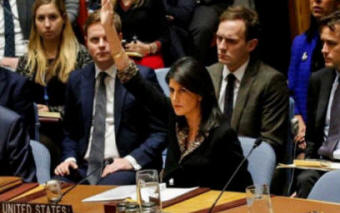
The Great Smoky Mountain Journal
Staff, Wire Reports
Posted: Sunday, January 21, 2018 07:29 PM
U.S. Warns UN About Thursday Vote Concerning U.S. Decision To Name Jerusalem Israel's Capital
A showdown is expected on the floor of the United Nations on Thursday, as countries prepare to vote on a resolution condemning President Trumpís decision to recognize Jerusalem as Israelís capital.
Trumpís decision, which he announced this month during a speech ordering
the State Department to begin moving the U.S. Embassy from Tel Aviv to
Jerusalem, rankled many in the global community. Critics worry that the
presidentís words will inflame tensions throughout the Middle East and
doom any hope of a two-state solution to the conflict between Israel and
the Palestinians for control of Jerusalem.
Turkish President Recep Tayyip Erdogan
said on Thursday that he hopes the United States will be "taught a
lesson" during a United Nations vote on the issue and accused Trump of
seeking countries whose "decisions can be bought with dollars."
"Mr. Trump, you cannot buy Turkey's democratic will with your dollars,Ē
Erdogan said. ďOur decision is clear."
Although Democratic and Republican presidents have long affirmed that
Jerusalem is Israel's capital, Trump's declaration to move the embassy
to Jerusalem on Dec. 6 departed from decades of U.S. policy, and
international consensus, that the fate of Jerusalem should be decided
through negotiations.
Israeli Prime Minister Benjamin Netanyahu said Jerusalem is Israel's
capital regardless of the outcome of Thursday's vote.
The Palestinians sought the General Assembly vote after the United
States on Monday vetoed a resolution supported by the 14 other U.N.
Security Council members that would have required Trump to rescind his
declaration on Jerusalem as Israel's capital and not move the U.S.
Embassy there. The Palestinians claim east Jerusalem, home to key
Muslim, Jewish and Christian holy sites, as their capital.
The resolution being voted on Thursday is co-sponsored by Turkey, chair
of the summit of the Organization of Islamic Cooperation, and Yemen,
chair of the Arab Group at the U.N.
The draft resolution says Jerusalem "is a final status issue" and
reaffirms 10 Security Council resolutions on Jerusalem, dating back to
1967, including requirements that the city's final status must be
decided in direct negotiations between Israel and the Palestinians.
It "affirms that any decisions and actions which purport to have altered
the character, status or demographic composition of the holy city of
Jerusalem have no legal effect, are null and void and must be
rescinded."
Despite the condemnation, the Trump administration isnít caving to
international pressure, with U.S. Ambassador Nikki Haley serving notice
that she "will be taking names" on who votes in favor of the resolution
Thursday.
We're always asked to
do more & give more," Haley wrote on Twitter. ďSo, when we make a
decision, at the will of the American ppl [people], abt [about] where to
locate OUR embassy, we don't expect those we've helped to target us. On
Thurs there'll be a vote criticizing our choice. The US will be taking
names."
Haley's threat drew sharp criticism from the Palestinian and Turkish
foreign ministers before they flew to New York for the General Assembly
vote. They accused the U.S. of intimidation.
Trump strongly supported Haleyís words and threatened to cut off U.S.
funding to countries that support the resolution.
"For all these nations, they take our money and then vote against us.
They take hundreds of millions of dollars, even billions of dollars and
then they vote against us," Trump told reporters on Wednesday at a
Cabinet meeting in Washington with Haley sitting nearby. "We're watching
those votes. Let them vote against us."
The Trump administrationís actions recalled to some veteran U.N.
diplomats the runup to the Iraq war in 2002 when then-President George
W. Bush launched a campaign against France and other opponents of
military action who refused to support a Security Council resolution to
authorize war. The resolution, which former British Prime Minister Tony
Blair was pressing for and the U.S. backed, was withdrawn by Britain
because it was certain to be defeated as a result of strong council
opposition.
The Associated Press contributed to this report.

